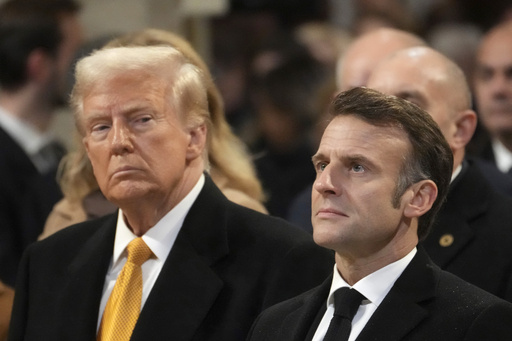LONDON — This week, the leaders of France and Britain are jointly traveling to Washington in an effort to dissuade President Donald Trump from withdrawing support for Ukraine amidst the ongoing conflict with Russia that has lasted for three years.
The dynamic between U.K. Prime Minister Keir Starmer and French President Emmanuel Macron suggests a “good cop, bad cop” strategy is at play as they seek to reinforce American backing for Kyiv.
Starmer, generally cautious and aiming to maintain diplomatic relations, prefers to position himself as a mediator between Europe and the U.S. Conversely, Macron has been more vocal in criticizing Trump for his comments that resonate with the Russian perspective and for recent American overtures to negotiate with Moscow, sidelining Ukraine in the process.
In a phone call on Sunday, the two leaders emphasized the need for the U.K. and Europe to present “united leadership in supporting Ukraine against Russian aggression,” as stated by Starmer’s office. They also underscored the importance of including Ukraine’s perspective and independence in potential peace discussions.
Macron cautioned Trump against projecting any weakness towards President Putin, asserting, “It’s not you, it’s not your trademark, it’s not in your interest.” He is scheduled to visit the White House on the anniversary of Russia’s full-scale invasion of Ukraine, with Starmer set to follow shortly after on Thursday.
In support of these diplomatic efforts, Macron convened a meeting of European leaders in Paris last week to chart a unified course of action. This follows Trump’s recent assertion that neither Macron nor Starmer have made significant contributions towards resolving the conflict over the past three years.
The French leader believes it is crucial to convince Trump that the interests of the U.S. align closely with those of Europe, warning, “If you allow Russia to dominate Ukraine, there is no stopping it.”
Starmer, on the other hand, has taken a more measured approach, choosing not to directly contradict Trump. The U.K. refrained from endorsing a joint statement at an Artificial Intelligence summit in Paris, which was seen as an overture to maintain favor with Washington.
Nevertheless, Starmer has been clear about the U.K.’s commitment to Ukraine, disputing Trump’s labeling of Ukrainian President Zelenskyy as a “dictator” and refuting suggestions that Kyiv instigated the conflict that erupted on February 24, 2022, when Russian forces invaded.
In a call with Zelenskyy over the weekend, Starmer reiterated the U.K.’s unwavering support and promised to emphasize “safeguarding Ukraine’s sovereignty” during his discussions in Washington.
Some historians suggest that the notion of Britain acting as a bridge to the U.S. is fundamentally flawed. Oxford University historian Margaret MacMillan noted that the concept of a “special relationship” has predominantly favored British interests, asserting that great powers ultimately act in their own best interest.
Macron and Starmer plan to advocate for Ukraine’s involvement in discussions about its future during their meetings in Washington. They aim to garner U.S. backing for a proposal that would see European forces deployed as a “reassurance force” for Ukraine’s security. Starmer has emphasized that this initiative requires a U.S. “backstop,” likely through American air power, to deter further Russian aggression.
Trump may express skepticism towards this plan, given his long-standing criticism of NATO and his assertions that the U.S. often provides security to European nations which do not contribute adequately.
Both leaders seem prepared to respond to Trump’s requests for increased European defense spending, with Macron stating last week that Europe must bolster its military engagement. France currently allocates just over 2% of its GDP to defense, while the U.K. invests 2.3%, with Starmer indicating this figure could rise to 2.5% during his U.S. visit.
Former NATO official Jamie Shea suggested that Starmer might leverage Trump’s interest in historical legacy by framing negotiations as “Mr. President, this will be your peace agreement. If it fails, how will history remember you?”
Trade discussions will also feature prominently in both leaders’ agendas as they work to mitigate the impact of potential U.S. imposed tariffs. Trump has been vocal about implementing reciprocal tariffs, and U.K. officials express hope that their exiting from the European Union, praised by Trump, will help avoid severe economic penalties.
Starmer also aims to address concerns regarding Trump’s controversial proposal about evacuating Palestinians from Gaza and U.S. fears over the U.K.’s arrangements concerning the Chagos Islands, a strategically important area.
In light of ongoing diplomatic efforts, if other tactics falter, Britain may resort to capitalizing on its royal connections. Reports indicate that Starmer will extend an official invitation to Trump from King Charles III for an elaborate state visit filled with traditional royal pomp.
This website uses cookies so that we can provide you with the best user experience possible. Cookie information is stored in your browser and performs functions such as recognising you when you return to our website and helping our team to understand which sections of the website you find most interesting and useful.
